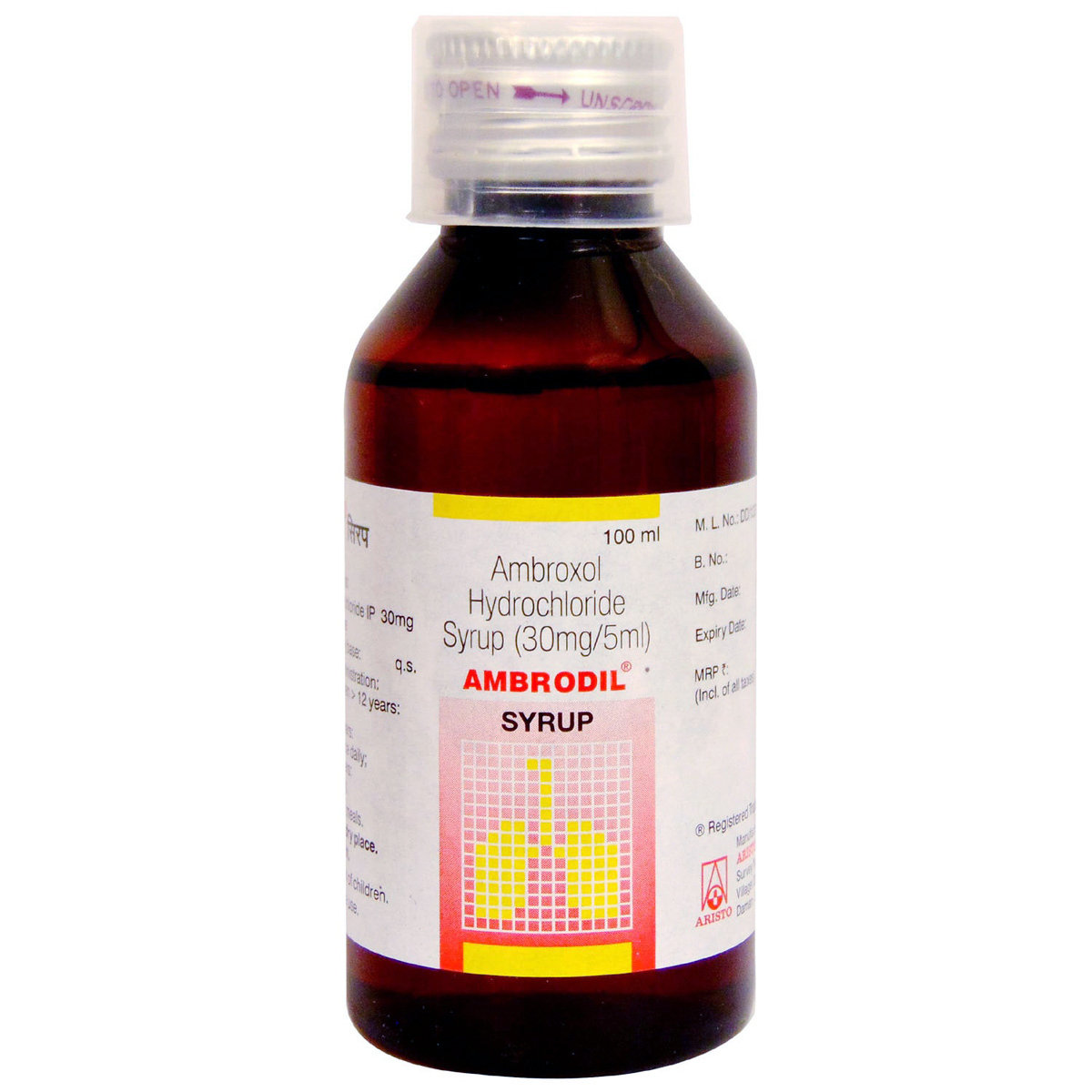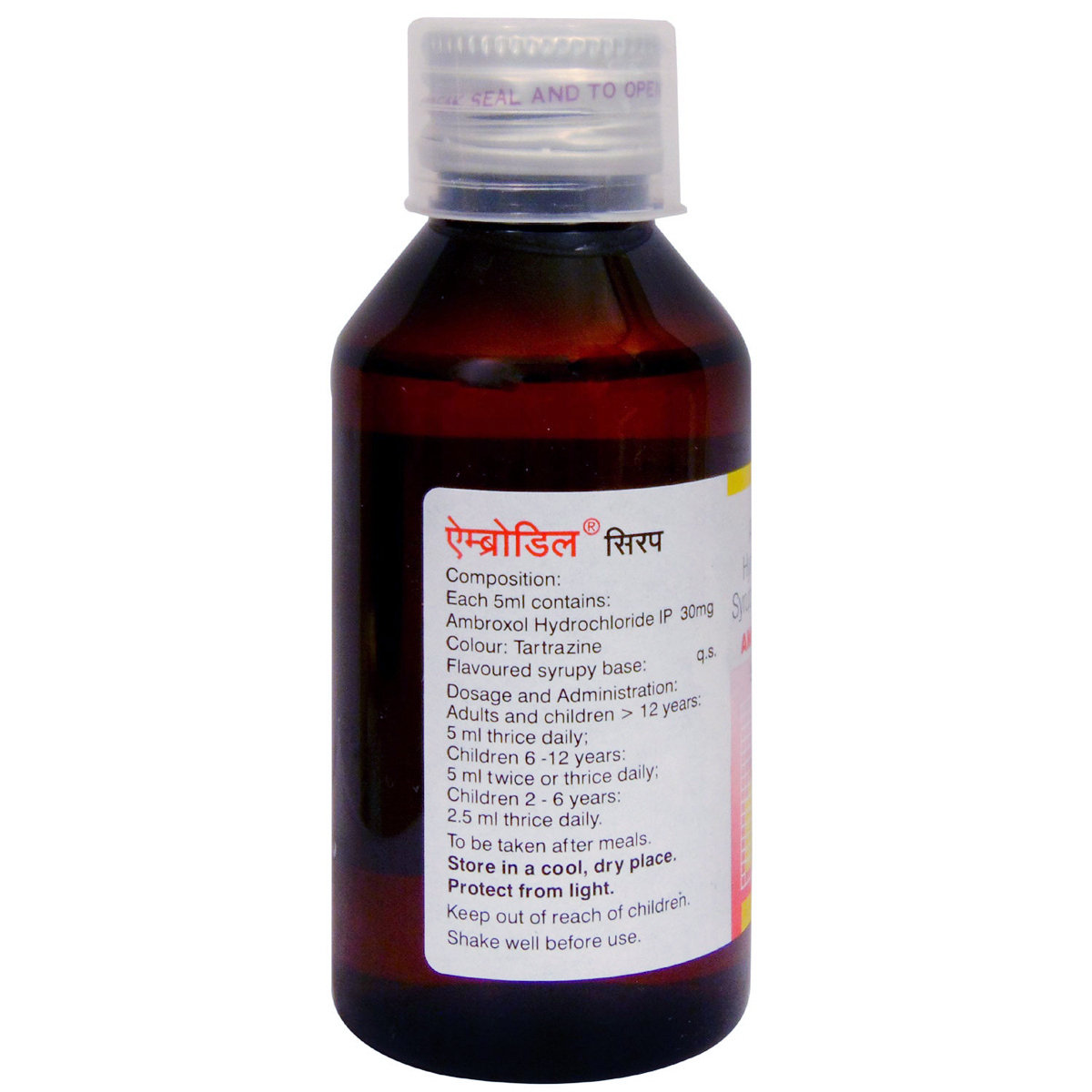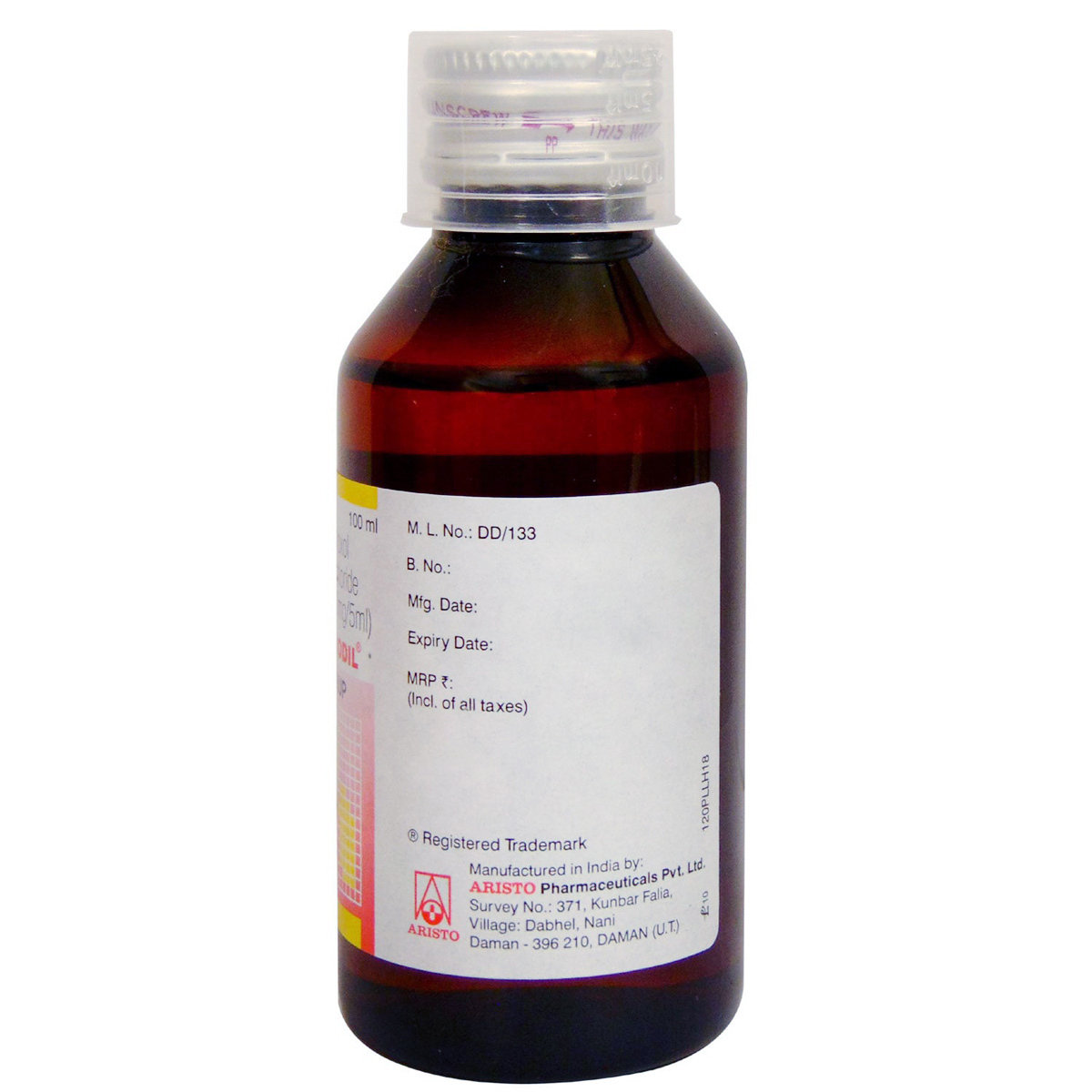Ambrodil Syrup 100 ml
MRP ₹84
(Inclusive of all Taxes)
₹12.6 Cashback (15%)
Provide Delivery Location
Online payment accepted
 Prescription drug
Prescription drugWhats That
Composition :
Manufacturer/Marketer :
Consume Type :
Expires on or after :
Return Policy :
About Ambrodil Syrup
Ambrodil Syrup belongs to a class of drugs called 'mucolytic agents' (cough/sputum thinner) primarily used to treat acute (short term) and chronic (long term) respiratory diseases associated with excess mucus. Ambrodil Syrup is used in the conditions of acute and recurrent bronchitis (airways infection), laryngitis (voice box infection), tracheitis (windpipe infection) and chronic diseases like chronic bronchitis and chronic obstructive pulmonary disease (COPD).
Ambrodil Syrup contains Ambroxol hydrochloride that works by thinning and loosening phlegm (mucus) in lungs, windpipe and nose. Ambrodil Syrup breaks down the acid mucopolysaccharide fibres and makes the mucous (sputum) thinner and less dense/viscous, removing sputum efficiently by coughing. However, the viscosity of sputum remains low for as long as treatment is maintained.
Take Ambrodil Syrup as prescribed. Your doctor will recommend how often you need to take Ambrodil Syrup based on your medical condition. Some people may experience side effects such as nausea, taste change, numbness in the mouth, tongue and throat. Most of these side effects of Ambrodil Syrup do not require medical attention and gradually resolve over time. However, if the side effects persist or worsen, please consult your doctor.
If you are known to be allergic to Ambrodil Syrup or any other medicines, please tell your doctor. If you are pregnant or breastfeeding, it is advised to inform your doctor before using Ambrodil Syrup . If you have kidney or liver problems, stomach ulcers, asthma or cough for a long time, please inform your doctor before taking Ambrodil Syrup . In children below 6 years, the liquid form is preferred as tablets are contraindicated.
Uses of Ambrodil Syrup
Directions for Use
Key Benefits
Ambrodil Syrup is a mucolytic agent (mucus thinner) that is used to treat acute (short term) and chronic (long term) respiratory diseases associated with excess mucus. Ambrodil Syrup helps in making sputum less viscous so that it can be coughed out easily in the conditions of acute and recurrent bronchitis (airways infection), laryngitis (voice box infection), tracheitis (windpipe infection) and chronic diseases like chronic bronchitis and chronic obstructive pulmonary disease (COPD). Ambrodil Syrup helps in thinning and loosening phlegm (mucus) in the lungs, windpipe and nose to cough out easily and provides relief from symptoms such as wheezing, coughing, tightness in the chest and shortness of breath.
Storage
Drug Warnings
Talk to your doctor before taking Ambrodil Syrup if you have had a cough for a long time, asthma or suffer from serious asthma attacks, liver or kidney problems, or peptic or duodenal ulcers. There have been reports of severe skin allergic reactions with Ambrodil Syrup , so if you develop a skin rash, immediately stop using Ambrodil Syrup and contact your doctor immediately. Avoid taking Ambrodil Syrup if you are pregnant or breastfeeding.
Drug-Drug Interactions
Drug-Drug Interactions
Login/Sign Up
Drug-Food Interactions
Drug-Food Interactions
Login/Sign Up
Diet & Lifestyle Advise
- Avoid dairy products such as milk as it may increase mucus production. Also, avoid processed or refined foods. Instead replace baked foods, fried foods, white bread, white pasta, French fries, sugary desserts and chips with green leafy vegetables.
- Drink plenty of fluids to avoid dry throat while you have a cough.
- Avoid citrus fruits as they may worsen the cough.
- Eat fruits that are rich in water content such as pears, watermelon, peaches and pineapples.
Side Effects of Ambrodil Syrup
- Nausea
- Taste change
- Numbness in mouth, tongue and throat
Habit Forming
Therapeutic Class
All Substitutes & Brand Comparisons
Author Details
We provide you with authentic, trustworthy and relevant information
Drug-Diseases Interactions
Drug-Diseases Interactions
Login/Sign Up
FAQs
Drug-Drug Interactions Checker List
- CODEINE
- AMOXICILLIN
- CEFUROXIME
- ERYTHROMYCIN
Special Advise
- If you are allergic to some sugars, please inform your doctor as Ambrodil Syrup may contain sorbitol.
- You are recommended not to take Ambrodil Syrup for more than 10 days without your doctor’s advice.
Disease/Condition Glossary
Cough: Coughing is a body’s way of clearing irritants (like allergens, mucus or smoke) from airways and preventing infection. Coughs may be dry or productive. A productive cough (wet cough) brings up sputum (phlegm, mucus and other matter) from the lungs. Dry cough does not produce sputum. Cough is commonly caused as a response to allergy or viral infection but coughing up mucus is possibly an infection in the respiratory tract.

Have a query?
Alcohol
Safe if prescribed
Interaction of alcohol with Ambrodil Syrup is unknown. Please consult a doctor before consuming alcohol with Ambrodil Syrup .
Pregnancy
Consult your doctor
Ambrodil Syrup is a Category C pregnancy drug and is not recommended for pregnant women especially in the first 3 months as it may cause harm to the unborn baby.
Breast Feeding
Consult your doctor
Avoid breastfeeding while taking Ambrodil Syrup as it may be excreted in breast milk and cause adverse effects in the baby.
Driving
Safe if prescribed
Ambrodil Syrup usually does not affect your ability to drive or operate machinery.
Liver
Consult your doctor
Take Ambrodil Syrup with caution, especially if you have a history of Liver diseases/conditions. The dose may be adjusted by your doctor as required.
Kidney
Consult your doctor
Take Ambrodil Syrup with caution, especially if you have a history of Kidney diseases/conditions. The dose may be adjusted by your doctor as required.
Children
Safe if prescribed
Ambroxol hydrochloride as a tablet is not recommended for children below 6 years of age. Ambroxol hydrochloride in oral solution form can be given to children below 6 years in doses prescribed by a doctor.










_0.jpg?tr=q-85)
